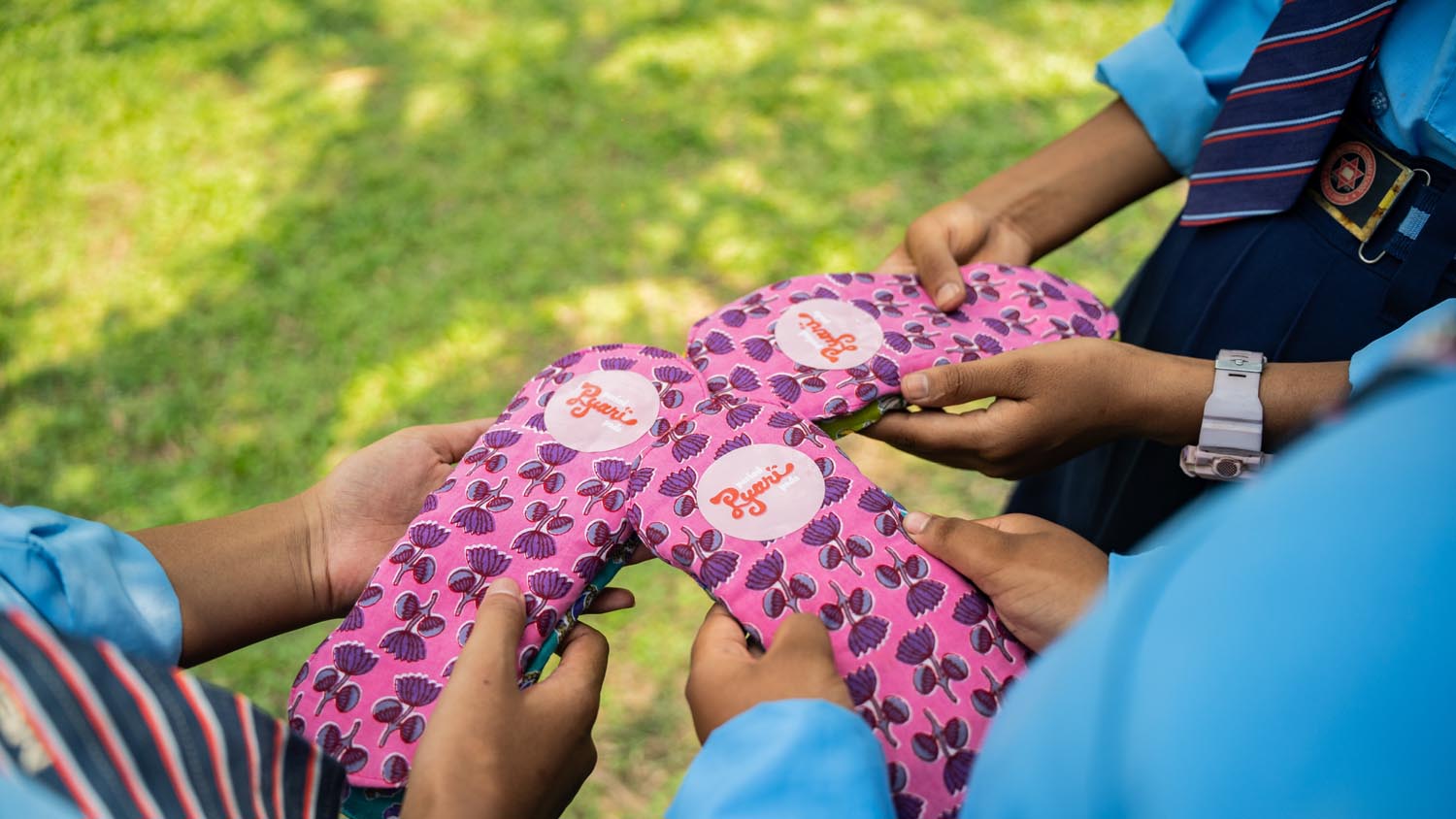Culture & Lifestyle
Pyari Period’s innovative approach to menstrual health
The organisation, founded by Nikita Paudel and Priyanshu Pokhrel, overcomes a key deficiency in health education by teaching the right use of menstrual hygiene products.
Rishika Dhakal
Seema Aunty from the TV series ‘Indian Matchmaking’ not only fixes marriages but also helps build friendships that lead to successful partnerships.
In 2023, during the South Asian Youth Initiative Program at Yale University, Nikita Paudel, a student there, was tasked with orchestrating Seema Aunty’s entrance for her speech at the three-day event. To surprise the audience, Paudel decided to have Seema Aunty wait in the basement bathroom. This is when Priyanshu Pokhrel, a student from Wesleyan University, came looking for the bathroom.
Paudel refused to let Pokhrel use the restroom, leading to a first awkward encounter that unexpectedly blossomed into a friendship. Paudel, a first-year master’s student in Public Policy, and Pokhrel, an undergraduate student at Wesleyan University studying economics, data science, and East Asian studies, are now the driving forces behind Pyari Period, an organisation dedicated to menstrual health management and education.
Pokhrel explains, “We don’t force people to learn about menstruation. Instead we work towards making them understand their bodies better. This approach extends to both individuals and institutions, like schools and offices.
Pyari Period, funded by Yale and Wesleyan University, aims to tackle critical challenges in health education by improving access to quality menstrual hygiene products.
The concept of Pyari Period was born when Paudel was a second-year student at Yale University taking a class on Sustainable Development Goals (SDGs). The class aimed to create a project to implement the 17 SDGs.
The first thing that struck Paudel’s mind was menstruation. “Having lived in the US since the age of 10, I had faced restrictions from my mother during my periods. This experience made me realise that the old-age stigma surrounding menstruation persists even today,” she says.
The company’s co-founder, Pokhrel, adds, “After my first year in the US as a student, I wanted to return to Nepal and do something for society. Pyari Period seemed like an opportunity to make a difference,” Having worked on similar menstruation projects through other organisations, she decided to collaborate with her partner.
After the two joined forces, Pyari Period was officially launched on May 28, 2024, during Menstrual Hygiene Day, with a public art campaign at Kamalpokhari, Kathmandu. By setting up a blank canvas, the founders invited people to draw whatever they wanted about menstruation to encourage dialogue and break the stigma.
Paudel wanted to name their company ‘Putali’. However, other organisations had already taken the name, so the founders settled for ‘Pyari’. “The name ‘Pyari’ has a playful tone and is easy to pronounce,” says Pokhrel.
The organisation started its pilot program in Syangja, using it as a base to understand menstrual health issues in various other districts. Lack of impact assessment of an area and overemphasis on product distribution without addressing different aspects of menstrual health has been the norm of many similar organisations in Nepal. Determined not to repeat the same mistake, Pokhrel says, “Before starting our campaigns, we learned the context of menstruation in Syangja. This approach helped tailor our efforts effectively.”
Therefore, during their visit to Lampata, Syangja, the founders interviewed students and government officials. This helped them learn about the challenges and discover that menstrual taboos affect people differently. Pokhrel remembers an intriguing conversation with a girl whose family didn’t observe menstruation-related restrictions. “The girl felt excluded from her friends and wished she could follow the same practices during her period, but her family wouldn’t allow it.”
This incident made them realise that it ultimately comes down to individual choice. Pokhrel adds, “Some people prefer to rest, stay out of the kitchen, and avoid work during their period. No one can dictate what they should or shouldn't do.”
Paudel adds, “We don’t want to impose on anyone’s decisions. If a woman chooses to isolate herself during her period, that should be her personal choice. We aim to empower people by allowing them to make their own decisions.” The campaign began at Shree Matribhumi Secondary School in Lampata, Syangja. The programme was a five-day training session in which sewing machines were used to teach 30 young girls how to make their reusable pads.
However, the founders were frustrated by the classroom's seating arrangement, which had boys and girls seated in different rows. They found teaching difficult because the boys would make noise and laugh, and the girls would feel shy. Only the next day, Paudel decided to alternate the seating arrangement—one boy followed by one girl—that the programme became effective.

“When the boys and girls were seated together, it promoted empathy and made it easier for questions to arise naturally and for actual conversations to happen,” says Paudel. The programme included educational sessions, games, and other activities. It encouraged the participants to demonstrate their understanding rather than just talk about it.
Students needed to be informed about alternatives to conventional menstrual products. The sanitary pads available were of poor quality, with some even being mouldy. The founders wanted to educate people about their options by providing hands-on demonstrations. “We demonstrated how tampons work and how to use a menstrual cup. The students also learned how to handle and dispose of these products,” says Paudel.
The programme’s primary focus is providing factual information and letting individuals question taboos. Pyari Period focuses on four primary areas: menstruation education, menstrual products, menstrual infrastructure, and government agencies.
Over time, they have realised that the problem related to menstruation is not limited to rural areas but extends to urban areas like Kathmandu. Therefore, they focus on conducting programmes in different schools and corporate offices to raise awareness about menstruation taboos.
With an eight-member team, Pyari Period is building networks with schools and developing an education kit to sell to parents and students. “We offer to bring our workshops to you, so you don’t have to come to us,” says Paudel. Their goal is to be a trusted brand.
Pyari Period has also introduced the Menstrual Tracker Bracelet. Featuring five colour-coded sections for each phase—menstruation, follicular, ovulation, luteal, and Premenstrual syndrome (PMS)—this bracelet allows an individual to track their period cycle by moving a charm daily. It also helps in managing symptoms, and recognising mood changes.
The founders observed that the current discussion around menstruation is divided. On one side, some emphasise the harmful effects of Chhaupadi, while others, with a “My period never stops me” mindset, argue that menstruation is not an issue at all. The founders believe neither extreme is entirely accurate. They argue that menstruation does come with challenges but also has manageable aspects, and it’s important to consider it from a balanced perspective.
The founders add, “To genuinely empower women, we must listen to their varied experiences and recognise that periods can be both challenging and manageable. Blind optimism doesn’t reflect the real experiences of many women.”
They acknowledge that the Pyari Period initiative shouldn’t be necessary, yet it exists because there is a clear gap in education and policies. To address this, they collaborate with the government to ensure the development of proper infrastructure and advocacy, assessing whether facilities are period-friendly and providing essential educational resources.




 9.83°C Kathmandu
9.83°C Kathmandu

.jpg&w=200&height=120)













